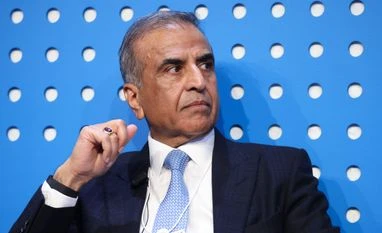Even as the race to establish space tourism and colonise the Moon and Mars has picked up the pace, satellite communications company OneWeb will keep its focus on providing broadband connectivity around the world to the three billion people who don’t have access to high-speed Internet, Bharti Enterprises Chairman Sunil Bharti Mittal told a group of reporters on a Zoom call on Sunday.
Speaking from London after completing Bharti Enterprises-backed OneWeb’s global constellation, Mittal said the India operation of the satellite communication service is expected to start around July-August though clarity on how spectrum would be allocated is awaited.
"Our focus remains on the communication space. There are a lot of ambitious and creative entrepreneurs who are looking at colonising the Moon and Mars. At my age, I would just have to watch these things develop. I wish I was in my 30s to start those things," Mittal, also executive chairman of OneWeb, said, replying to a question from Business Standard on his space ambitions. OneWeb aims to provide broadband connectivity in remote areas of the country and bridge the digital divide.
OneWeb launched its final 36 satellites on Sunday morning to complete a constellation of 618 satellites. Earlier in the day, the company announced the satellites were deployed and contacted in space by NewSpace India (NSIL), the commercial arm of the Indian Space Research Organisation (Isro), from the Satish Dhawan Space Centre in Sriharikota.
Lift-off took place at 9 am and OneWeb’s satellites separated successfully from Isro’s heaviest payload rocket, LVM3, and were dispensed in nine phases over 1 hour and 14 minutes, with the signal acquisition on all 36 satellites confirmed.
The OneWeb constellation design calls for 588 satellites for global coverage and additional satellites are planned for resiliency and redundancy.
“By the year-end, OneWeb will be ready to roll out global coverage, enhancing its existing connectivity solutions that are already live in regions north of 50-degrees latitude as it brings new areas online by partnering with leading providers," the company said.
Also Read
On whether disruption was likely in the space/satellite communication sector like in the case of telecom, Mittal said competition in the industry was heating up but there was room for many. The presence of too many players may make consolidation important, he added.
Along with OneWeb, Mittal pointed to Starlink, the satellite internet constellation operated by Elon Musk's SpaceX, and Amazon-backed Project Kuiper completing the space communications industry. But OneWeb's 600-plus Low Earth Orbit (LEO) satellites, which are located far closer to Earth than Geostationary orbit (GEO) satellites, would set it apart from other competitors, he stressed.
“We will be the only one which has a combination of GEO and LEO satellites. That is a very powerful, potent combination," Mittal said.
He pointed out that Oneweb would not compete with any telecom company in India or across the globe. Instead, it’s working with US-based Verizon and others to bring its services live.
About tariffs, Mittal said: “If you ask me, can the pricing of satellite communication be at par with mobile tariffs? Whatever is currently available in the Western world, it can be done today. What is available in India for 2 and 2.5 dollars a month? No, because that is pricing which is extremely low.”
Eyes on spectrum & FDI
While all the requisite licences are in place, the government's upcoming spacecom policy and a final decision on whether the Centre will allow administered allocation of satellite spectrum or mandate spectrum auction, will be key to the company's plans of beginning service in India on time, Mittal said. Even as many players in the telecom industry have maintained spectrum should be auctioned for space communication services, Mittal said: “The government is expected to follow the global norm (of not opting for the auction route).” He specifically complimented Prime Minister Narendra Modi’s initiative to give the private sector center-stage in space communications.
He expects the spacecom policy to allow foreign direct investment into the sector. “This will clear the way for the UK-based holding company OneWeb to invest in the company's India arm and form a joint venture,” he said.
Headquartered in London, OneWeb has offices in Virginia, US, and a satellite manufacturing facility in Florida -- Airbus OneWeb Satellites -- that is a joint venture with Airbus Defence and Space. Bharti Enterprises is the largest shareholder in the British company, commanding a 30 per cent stake. French satellite operator Eutelsat, the UK government, and SoftBank are some of the other large shareholders.
Meanwhile, In the draft Telecom Bill released last month, the Department of Telecommunications (DoT) has extended the definition of “telecommunication services” to satellite-based communication, thereby giving itself the exclusive right to assign the spectrum.
But Isro, along with industry players, have cited the limited quality of satellite spectrum, the global shared nature of radio waves, and its vast, yet unrealised industrial and scientific use cases to ask the DoT to not regulate it.
Business model
OneWeb will not be handling customers. The enterprise wing of Airtel will be selling the services to customers on the ground, Mittal said.
Hughes Communications India, (HCIPL), which recently created a joint venture with Airtel, will be the primary source of sales into the rest of the market including government and defence entities. HCIPL is a majority-owned arm of US-based satellite operator Hughes Network Systems.
Two ground stations, in parcels of 30-40 acres, are being set up by OneWeb in remote locations in Gujarat and Madurai. Indus Towers and Nextra, Airtel's data centre business, are setting these up. Also, Mittal highlighted opportunities to manufacture user terminals in India in the backdrop of the current geopolitical situation vis-à-vis Chinese firms.
With inputs from Shine Jacob
)